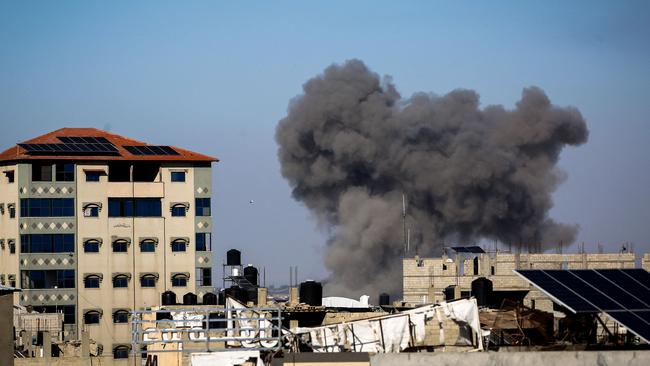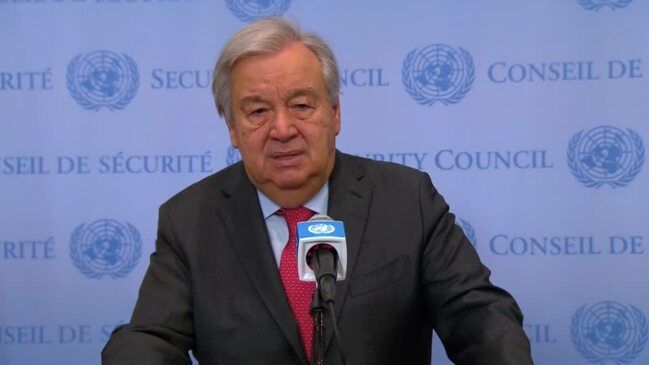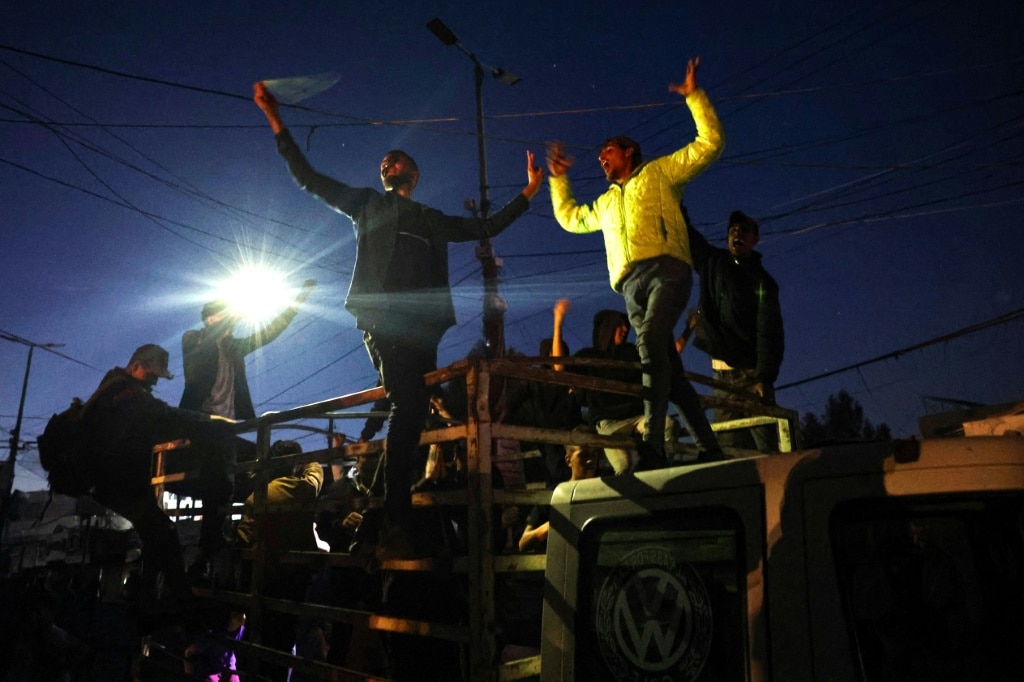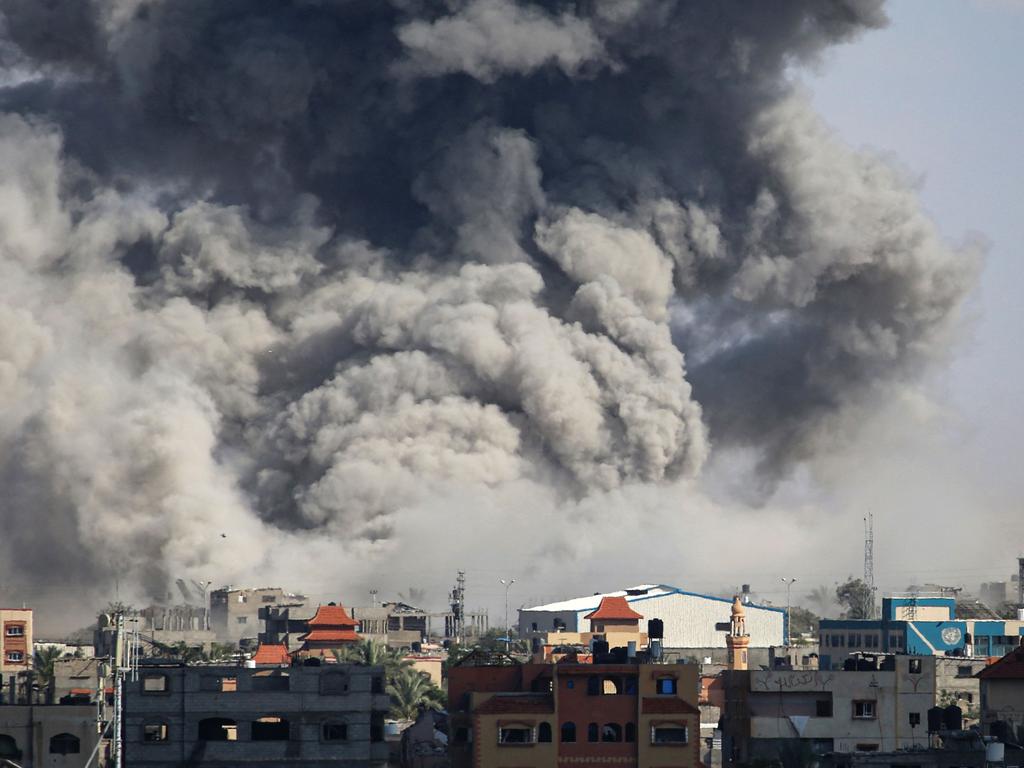Israeli forces seize key Gaza crossing ahead of planned Rafah offensive
Israel sent tanks into Rafah and secured a strategic corridor as high-stakes negotiations for a truce and hostage releases intensified.

Israel sent tanks into Rafah and took control of the Gazan side of a key border crossing to Egypt, securing a strategic corridor as high-stakes negotiations for a truce and hostage releases intensified.
Israeli military footage showed its tanks moving in on the crossing in the Gaza city where over one million people are sheltering. The movements followed a series of air strikes against Hamas targets and warnings for civilians in the eastern part of Rafah to evacuate to zones in the west, as Israel prepares for a military offensive in the border city.
Meanwhile, an Israeli delegation, Hamas officials, mediators from Qatar and the head of the Central Intelligence Agency arrived in Cairo on Tuesday for discussions on a ceasefire proposal from the militant group. CIA Director William Burns arrived there from Qatar as he visits the region to further the Biden administration’s efforts to help mediate a ceasefire deal.
Israeli Prime Minister Benjamin Netanyahu said that the Hamas proposal fell short and that he had instructed the Israeli delegation in Cairo to insist on the conditions Israel requires for its security.
“Hamas yesterday intended to sabotage the entry of our forces into Rafah” by saying it had agreed to a truce deal, Netanyahu said Tuesday. “It did not happen,” he said.
Netanyahu says Israel needs to break up four remaining Hamas battalions in Rafah to achieve its goal of destroying the group’s ability to attack Israel and achieve victory in the war.
Hamas said Monday that it would agree to a ceasefire pact that would involve an exchange of hostages abducted by the group on Oct. 7 for Palestinian prisoners in Israel. But the group added conditions that Israel hadn’t approved, including a complete Israeli withdrawal from Gaza and an end to the Israeli blockade on the enclave.
Israel’s military said the border-crossing operation was “very precise and limited in space,” and aimed at eliminating Hamas militant infrastructure after the group fired rockets and mortars at the Israeli-controlled Kerem Shalom border crossing on Sunday, killing four soldiers and wounding several others.
Kerem Shalom, one of two main entryways for aid into Gaza along with the Rafah crossing, remained closed on Tuesday, Israel said.
Hamas’s military wing claimed responsibility Tuesday morning for another rocket barrage on Kerem Shalom, signalling it was refusing to back down. The Israeli military said rockets and mortars had been fired at Israeli territory from Rafah but that there were no injuries.
The move to take the Rafah crossing has strategic as well as symbolic value, suggesting Israel can operate where it likes. Analysts say the increased military activity in Rafah is directly tied to the negotiations and aimed at increasing pressure on the militant group.
“If Hamas will not go into a deal, Israel is keen to go further into Rafah,” but could potentially stop with the crossing, said Israel Ziv, a former commander of the Israeli military’s Gaza Division.
Israeli Defense Minister Yoav Gallant said Tuesday that the operation would continue “until we eliminate Hamas in the Rafah area and the entire Gaza Strip, or until the first hostage returns.” The Israeli government has maintained from the start of the war that the only way to bring Hamas to the negotiating table is through military pressure. The seizure of the Rafah crossing also positions the military to launch a broader operation if talks collapse completely.
Around 20 militants were killed during the Israeli operation to seize the crossing, according to the Israeli military. Three tunnel shafts were discovered, and special forces were continuing to scan the area, the military said. An explosive-laden car driving toward Israeli troops was struck. No Israeli soldiers were injured, according to the military.
Hamas called Israel’s operation a dangerous escalation that would harm humanitarian aid flow to the city. “We call on the U.S. administration and the international community to put pressure on the occupation to stop this escalation that threatens the lives of hundreds of thousands of displaced civilians in Rafah and the entire Gaza Strip,” it said in a statement.
The Gaza Strip is ensnared in a humanitarian crisis including potential famine, while fuel used to power generators and move goods and people by vehicles is facing acute shortage.
The United Nations, which coordinates the entry of aid into Gaza, warned Tuesday that the cut-off of the two main arteries for aid imperils humanitarian operations that serve the entire population of some 2.2 million people.

“The closure of both the Rafah and Kerem Shalom crossings is especially damaging to an already dire humanitarian situation,” said U.N. Secretary-General António Guterres.
The U.S. pressed for the reopening of both crossings to facilitate humanitarian aid, a State Department spokesperson said.
“It remains our top priority to reach a ceasefire agreement that will lead to the release of hostages and that will allow a surge of humanitarian assistance both into Gaza and allow it to move around inside Gaza,” the spokesperson said.
The U.S. has pressed Israel to avoid a full-scale assault on Rafah, fearful of the humanitarian toll, and has stepped up pressure on Israel and Hamas to try to secure a ceasefire.
Israel has long been concerned that the border area with Egypt has been a route for smuggling weapons and people into Gaza and is a critical element of Hamas’s military supply chain. Israel has pressed for tighter controls in a section that runs the length of the border with Egypt known as the Philadelphi Corridor. A 1979 peace treaty between Israel and Egypt limits the troop presence on both sides.
“The corridor is much more important than the four battalions of Hamas that you have in Rafah,” said Ofer Shelah, a military analyst with the Tel Aviv-based Institute for National Security Studies and a former politician. “Hamas has been resupplying itself and reinforcing itself mainly from the Sinai Desert.”
Israel informed Cairo in advance about its plan to seize the Rafah crossing on the Gaza side and assured Egypt that it would be a targeted military operation, according to Egyptian officials familiar with the matter. In turn, Egypt warned Israeli officials that any attempt to expand Israeli control across the Philadelphi Corridor wouldn’t be tolerated, the officials said. Egypt’s Foreign Ministry condemned the Israeli operations in Rafah.
Egypt, worried about a rush of people fleeing a potential Israeli ground offensive in Rafah, has already fortified its border.
The Egyptian officials said Cairo was closely monitoring the situation across the border with Gaza but wasn’t immediately bolstering its military presence there. Egypt, worried about a rush of people fleeing a potential Israeli ground offensive in Rafah, had already fortified its border in recent months and deployed more tanks and infantry fighting vehicles to the area to prepare for a potential refugee crisis.
The Israeli military didn’t say how long the operation would last. It said many people had heeded its call to evacuate eastern Rafah before the operation.
Some analysts were sceptical that a broader operation in Rafah could achieve this without decisiveness from Israel about who could govern Gaza after Hamas. “It’s a big mistake. The risks are too high and the results are going to be that we hit Hamas but they are going to recover again,” said Ziv.
More than 34,000 Palestinians have been killed since the start of the offensive in Gaza, most of them civilians, according to Palestinian authorities, who don’t specify how many were combatants. Israel invaded Gaza after a Hamas-led attack on southern Israel on Oct. 7 killed some 1,200 people, most of them civilians, according to Israel.
Dow Jones







To join the conversation, please log in. Don't have an account? Register
Join the conversation, you are commenting as Logout